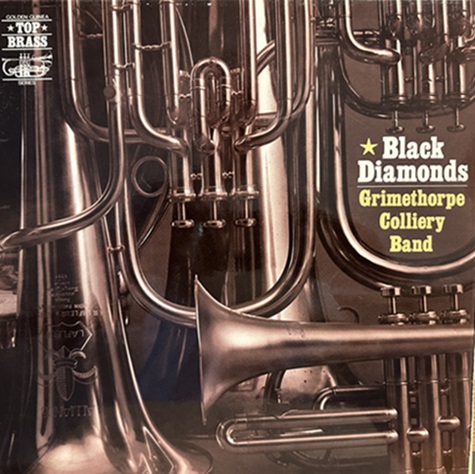
Grimethorpe Colliery Band
Conductor: George Thompson
Soloists: Brian Cooling; David Moore; Brian Smith
Golden Guinea ‘Brass Band’ Series
PYE Records: MONO GGL 0392/STEREO GSGL 10392
The Grimethorpe Colliery Band of early 1967 under George Thompson was on the cusp of greatness.
Their first British Open success on ‘Comedy’ was just months away, followed by a second Belle Vue victory in 1969 and a first ‘National’ a year later. The pioneering inventiveness of the Elgar Howarth era was just beyond the horizon.
50th anniversary
The LP release marked the band’s 50th anniversary (and which paid noted thanks to both the National Coal Board management and the CISWO organisation); their most recent success coming at the 1966 Industrial Eisteddfod in Middlesborough – “joint first prize winners with the famous Black Dyke Mills Band”.
These were optimistic times. The future of the pit (which had merged with another in 1967 and employed up to 6,000 men extracting 1 million tonnes of coal at its peak) and the band was secure; the players enjoying employment and social facilities that were to play a major part in their emerging success.
It was an ensemble of experienced, mature men (although with “local lads” such as Peter Roberts and 17 year old David Moore already embedded in the ranks), the rugged tonality hewn from the ‘Black Diamonds’ dug from the ‘Barnsley Seam’ deep below their feet.
It was an ensemble of experienced, mature men (although with “local lads” such as Peter Roberts and 17 year old David Moore already embedded in the ranks), the rugged tonality hewn from the ‘Black Diamonds’ dug from the ‘Barnsley Seam’ deep below their feet.
Flamboyant artistry
There was however an identifiable, flamboyant artistry too, whose source emanated from their MD’s musical approach.
George Thompson was a real ‘one-off’ – “a very well-known personality” as the LP sleeve notes described him. He was also one heck of an astute musician.
That is certainly heard on this recording (which came in mono and stereo as well as an export version on the Astor label); the ‘grand march’ of Gounod’s ‘La Reine De Saba’ played with verve and energy, as is Reissiger’s ‘Mill on the Cliff’, which comes with an added dollop of dramatic impulse.
Distinctive
There is sophistication to the distinctive ebb and flow to Thompson’s own arrangement of Mendelssohn’s ‘Fingal’s Cave’ and an authentic boldness to the march ‘Punchinello’, played without recourse to any ‘Whit Friday’ artifice.
Tastes have moved on from ‘I-Tiddley-I-Tie’ and the trombone trio ‘Three Grenadiers’, although the stylish elan in which they are played still makes mark.
It is a display of finesse and artistry that has the eternal value of any diamond dug from deep below the ground.
As do the three soloists: Brian Cooling playing with razor sharp virtuosity on the cornet solo ‘Starlight’, and David Moore (who went on to become Champion Soloist of Great Britain in 1969 and 1970) rattling off ‘La Belle Americaine’ with nonchalant youthful aplomb.
It is Brian Smith on horn that really stands out though with a rendition of ‘Silver Threads’.
It is a display of finesse and artistry that has the eternal value of any diamond dug from deep below the ground.
Iwan Fox
Play list
Side 1:
1. La Reine De Saba (Gounod)
2. Starlight (D. Rimmer)
Soloist: Brian Cooling
3. Three Grenadiers (Ashpole)
4. Fingal’s Cave (Mendelssohn arr. Thompson)
Side 2:
1. Mill on the Cliff (Reissiger arr. D. Rimmer)
2. La Belle Americaine (Hartmann)
Soloist: David Moore
3. I-Tiddley-I-Tie (Roper arr. Steadman-Allen)
4. Silver Threads Amongst the Gold (Allison)
Soloist: Brian Smith
5. Punchinello (W. Rimmer)









